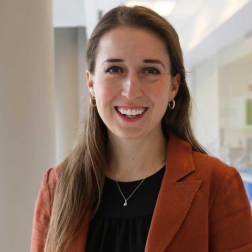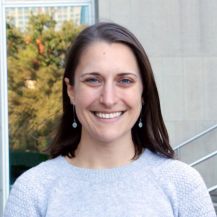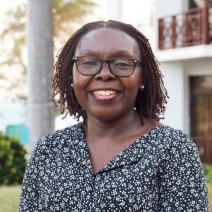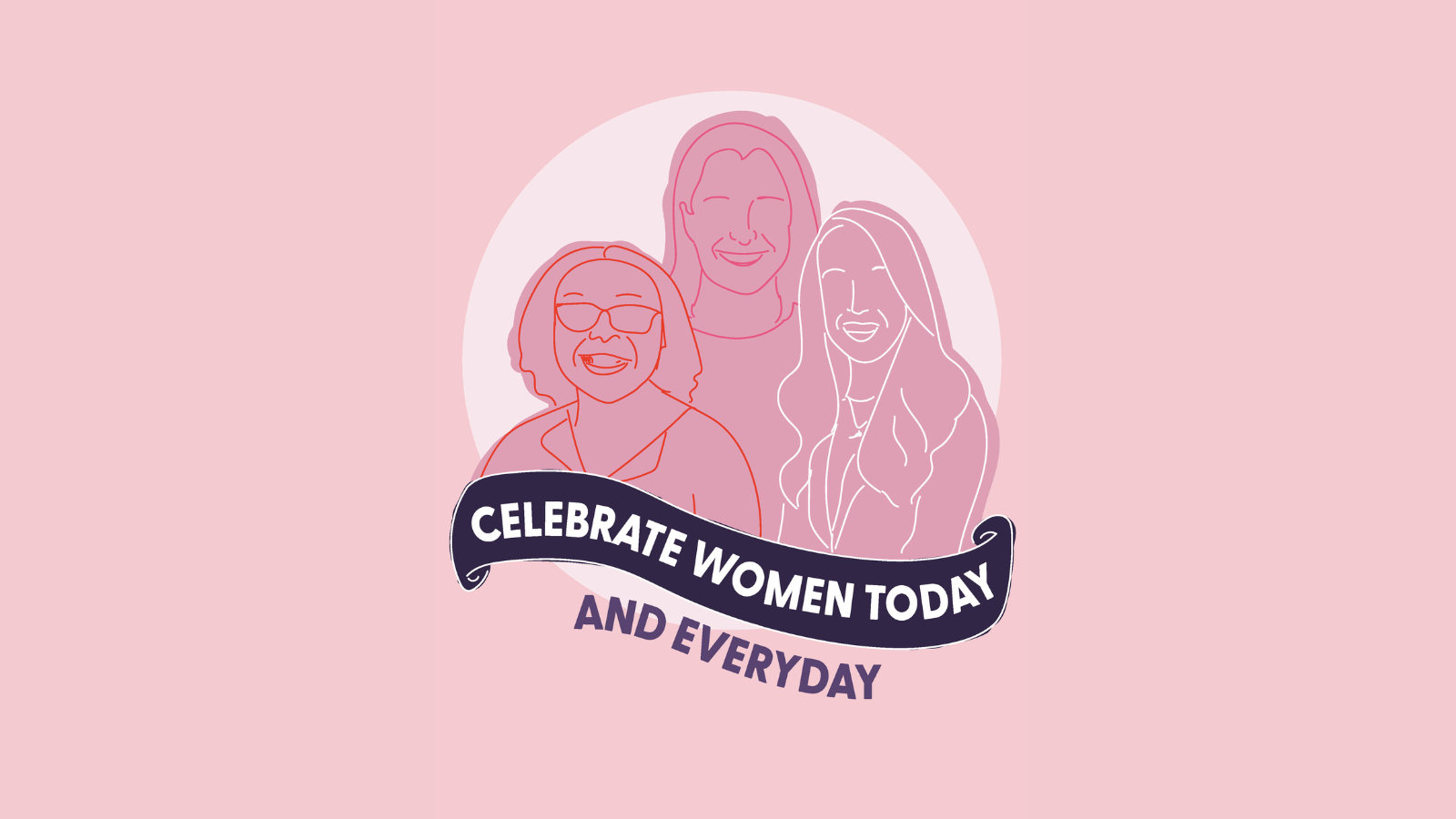International Women's Day (IWD) is a global holiday celebrated annually on March 8, bringing attention to women’s rights, gender equality, reproductive rights, and violence and abuse against women.
Rice360 Institute for Global Health Technologies would like to uplift women and girls all over the world who are passionate about global health and help create a world driven by innovation, equity, community, integrity, accountability, empowerment and transformation.
This International Women’s Day, we look within our institute and interview three women who are not only leaders but are passionate and dedicated experts committed to ensuring that everyone, everywhere, has equitable access to quality health care. We hope their words inspire women everywhere.
—
Ashley Taylor, PhD, MPH
Director of Education at Rice360

“I am passionate about cultivating education ecosystems that empower students and faculty both here at Rice University and with partners all around the world to solve local and global challenges. I so firmly believe that students have the power to solve the most pressing issues of our time if they have the resources to do it; that’s what I’m really passionate about.” – Ashley Taylor
Interviewer: Who do you consider your role model and why?
Ashley Taylor: I would say one of my greatest role models is my mom. My mom is such a strong woman, and is also incredibly kind. I think being both strong and kind is something we should all aspire to do.
Interviewer: Can you describe some obstacles you have overcome in your career? And what are some goals you are currently working towards?
Ashley Taylor: After years of being a woman in engineering, I've learned that it’s so important for us to show up as our authentic selves—to bring our lived experiences, our passions, and who we are at our core into our work. It can be hard to be authentic and show up, but I know that the world needs all of us to solve problems with the best of our intellect, the best of our experiences, and the best of our minds and our hearts. For me, that’s been the biggest lesson: we need to show up as ourselves, and we need to make space for other people to do that; we need all of us at the table solving challenges.
Interviewer: How did you start your career in global health and do you have any advice for aspiring young women?
Ashley Taylor: Mentors helped propel me into the global health field by illuminating the intersection of engineering and global health and helping me see myself and my passions for those paths. Also, my undergraduate research provided valuable exposure to this intersection and allowed me to gain hands-on experience.
I am so deeply grateful to the mentors both in my undergraduate journey and to those I have met in Malawi. My mentors showed me possibilities, and the impact engineers can have on global health. By illuminating those opportunities for engineers to be a part of global health, I really saw myself in those spaces, and I’m so grateful to the mentors that showed me those opportunities. Theresa Mkandawire, for example, is an amazing woman in engineering and is now one of our partners leading invention education in Malawi as part of NEST360.
An entry point, and a bit of encouragement to people looking to enter the field, is to pursue meaningful relationships with mentors. Listening and learning from the experiences of trusted mentors was key. I also think very practically, for me, undergraduate research was a great way to experience and learn what I was genuinely passionate about and not passionate about. One thing I tell our students now is if you try a research experience or an internship and you don’t love it, that’s okay. That gives you more information to steer in the direction you are passionate about.
I would like to echo the same thing I said earlier. If I could give one piece of advice to my former self a decade ago—it would be the strongest, most encouraging piece of advice I also could give to students or young women now—Be yourself! Be authentic! The only way we’re going to solve the most pressing and urgent challenges of our time is if we have a team full of people contributing the best of their experiences. But, in order to do that effectively, we all must be authentic. So be authentic, be yourself, bring your lived experience to the table and find those spaces that support you.
—
Elizabeth “Betsy” Asma, MSc
Director of Technology Development at Rice360

“I am the Director of Technology Development at Rice360, and I support the engineering, design, development, and clinical implementation of health technologies. I support young engineers both in Houston and at our partner countries to help them focus their efforts in global health engineering and make opportunities for them to learn and grow their skills.” – Betsy Asma
Interviewer: Who do you consider your role model and why?
Betsy Asma: My role model is definitely my mom. It’s great that we have strong women in our lives. I think every strong woman has an army of strong women supporting her. [My army of strong women] started with my mom. She will always be the core of the strong women who have supported me.
Interviewer: Can you describe some obstacles you have overcome in your career? And what are some goals you are currently working towards?
Betsy Asma: I’m kind of mid-career now, but I would say early on, my background is engineering, and as a female engineer, you definitely have to go through some of these hard experiences. It’s not necessarily an obstacle; I think of it more as a talent. Being a woman in a male-dominated field like engineering can be quite intimidating, especially as a high school student or starting your freshman year of college.
I have been in classes in undergrad where there were 20-30 students, and I was the only woman, and my professor was a man as well. I think that has changed quite a lot since I’ve been in college. I hope that girls aren’t the only girl in their course anymore, and they have more professors that look like them.
It’s quite intimidating to look around a room, and no one looks like you—your professor doesn’t look like you, and your classmates don’t look like you. It can be intimidating, but you have to learn how to quickly get past that and work with your peers.
Interviewer: How did you start your career in global health and do you have any advice for aspiring young women?
Betsy Asma: My career and interest in global health began in college. My undergraduate degree is in engineering, and my college had a capstone class – like most engineering schools. My capstone senior engineering project was in global health. That exposed me to the need for global health technologies and inventions. At that time, there weren’t many people working in global health field in terms of engineering. People were beginning to realize the need for technology to solve a lot of these problems.
I realized I needed to learn more about global health, so I got my master’s degree in global health. That was a two-year master’s program that exposed me to careers in global health, job opportunities, and people working in this space, which also led me to Rice360.
I’d advise young women that as women in science, global health, and engineering, they should recognize that their lived experiences bring value to this field. If you look around the table, not saying that you must represent every identity you have, but you experience the world in a unique way that brings incredible value to projects. Somebody else may not have that same lived experience. So, my advice is to know and own that lived experience and bring your value to the table with your team.
—
Helen Bokea, MPH, MSc
International Programs Director at NEST360

“I provide strategic leadership and oversight for the implementation of the Newborn Essential Solutions and Technologies (NEST360), an international alliance united to end preventable newborn deaths in African hospitals.” – Helen Bokea
Interviewer: Who do you consider your role model and why?
Helen Bokea: My greatest influences are my parents. For the short 13 years that I knew my father, I learned the value of education, keeping your word, timekeeping, industry, candor and always doing your best. Orphaned at an early age, he paid his way through school, working on sugarcane farms over the holidays to raise tuition fees. When he finished school and got a job, he studied by correspondence during his free time and qualified as a Chartered Accountant, later leaving employment at 35 to set up a private accountancy practice. His was an example of how education can change one’s life and pull them out of poverty. From my mother, who raised me and my siblings alone following the sudden demise of my father in a road crash when I was 13, I learned about the strength of a woman. Widowed at a young age of 37 and left with seven children to raise aged between 18 and four years old, she soldiered on without ever complaining of the load. It was only when I was older that the magnitude of what she had to overcome became clearer. Most of all, she did all things joyfully while embracing all. From her I learned perseverance, giving oneself, joy and grit.
Along the way in my career, I have met many other role models. Since joining global health 16 years ago, Professor Paul Courtright, my boss of five years in my previous role, stands out. Paul gave me an opportunity to grow and nurtured me as a leader. He believed in me and thrust me into leadership situations at every opportunity he had, including even when I doubted myself. We worked well together, and he treated me as his equal, seeking my opinion, trusting that I will do the right thing and somehow knowing to come in when he needed to. Even
the best dancer in the village needs a stage on which to showcase their skills. Thank you, Paul, for giving me the stage.
Interviewer: Can you describe some obstacles you have overcome in your career? And what are some goals you are currently working towards?
Helen Bokea: Raising a young family while growing my career was a tough balancing act. Like many women, the opportunity for growth at the workplace coincided with a most productive personal phase. Most of my roles involved regular travel away from home. I constantly struggled with the guilt of being away from my young children. One day a good friend said to me, “I know what you need,” and linked me up with a wonderful woman who has been my housekeeper for the past 22 years. My husband was very supportive, and it helped that he was great with the children. I soon made peace with the fact that there would be trade-offs if I had to pursue a career and have a family. When I was at work, I was present 120%, and when I got back home, I again gave it my all.
Getting back into the workplace after a long parental leave necessitated by health issues was also tough. In the end, I accepted a lower position, taking a pay cut just so that I could re-enter the workplace.
As I enter the second half of my life, I am constantly reflecting on how to give back. I have benefitted from many people, and I am the sum total of the goodwill and support of many. I take up opportunities to mentor younger women. I am currently equipping myself with skills to help me formally coach and mentor young women entering global health, those navigating the messy middle and even those already in senior leadership. Regular support to needy bright children to stay in school through payment of tuition fees, keeps me grounded. Every year for the past several years, I add one more student to my list. Women’s empowerment is also close to my heart, and I continue to consider how I can contribute towards empowering other women. After all, I am a testimony of what it means to be raised by an empowered woman and know that when you educate women, you are setting up children, families and indeed the whole community for success.
Interviewer: How did you start your career in global health and do you have any advice for aspiring young women?
Helen Bokea: My career in global health was long coming. From early in my childhood, I wanted to work in the health sector. My encounter with things medical began early. Syringes and needles were a common feature in our home from as early as seven years old when my brother, who was a year younger than me, was diagnosed with type 1 Diabetes. My mother taught him how to inject himself, and we witnessed him self-administer insulin shots daily.
My mother was a nurse/midwife later transitioning to a social worker. Early in her career, she headed a residential family-life center where mothers with malnourished children would be admitted for management. During their stay, the mothers were taught how to feed their children a balanced diet using available local foods while the children were treated until they recovered. We lived within the compound of the center, and sometimes at lunchtime, my mother would come home with some of the children. I was always amazed at the transformation of these little ones from hairless pot-bellied cranky ones on the day they reported to cheerful and chubby toddlers with crops of sprouting hair at the time of discharge. I always wondered what it would take to be able to perform that kind of “magic”.
The one thing I was sure of as I grew up was that I would not end up on the medical side of things health. After all, I couldn’t bear to watch my brother inject himself. Later when I joined secondary school, I could not stand the smell of the biology lab where the older students would leave their dissected mice.
Along the way working in international development as a program specialist, I ventured into managing health programs and enrolled for and obtained a Master’s in Public Health. Since then, I have continued to grow from managing health research capacity strengthening programs; to providing technical assistance and programmatic support to countries working towards elimination of trachoma as a public health problem; to currently overseeing implementation of a neonatal mortality reduction implementation research program for small and sick newborns.
For young ladies aspiring to a career in global health, this journey is unlikely to be linear from my personal experience. You will learn many things along the way and sometimes wonder whether they will get you to where you are trying to go. In the end, it all comes together. No experience is wasted so give it your best always. Know where you want to go and keep reminding yourself about it. Stand for something and you will be known for something. Grow your knowledge base. Keep learning. When you are knowledgeable, your knowledge will give you the confidence to speak with conviction and authority.
Work on yourself to ensure that you are growing all round – spiritually, mentally, intellectually, physically and emotionally. Find something to do that fulfills you besides work. Give back whenever you have an opportunity. There is a lot of fulfillment in touching other people’s lives plus it makes the world a better place. Live your life to the fullest and enjoy every moment. There will be difficult moments along the way; however, with a positive attitude, you will navigate them successfully. That one friend who genuinely cares about you, who shares your values and who calls you out when you are being obnoxious is a must have. As a human being, you will make mistakes and will need someone in your corner who points this out to you but also objectively and lovingly corrects you to keep you grounded. Lastly, run your own race. Do not get signed up for someone else’s marathon.
So far, I have had an exciting career in global health, rising steadily as a woman leader. My mother greatly influenced my leadership journey. Because of her, I always believed that it was also possible for me to succeed. If she could do it in harder circumstances with more people to take care of and less support, then I believed I could also do it.
For women who have the privilege to lead in global health, we have an opportunity to demonstrate and model what it means to be women leaders. We are held to a higher standard despite the fact that we have to navigate more challenges. We must remember that other women are watching us, and through our example, they will see the possibility to succeed. Most of all, we have a duty to create and clear the path for other women because often from our own journeys, we are aware of the biases and roadblocks we have had to overcome to get where we are.

